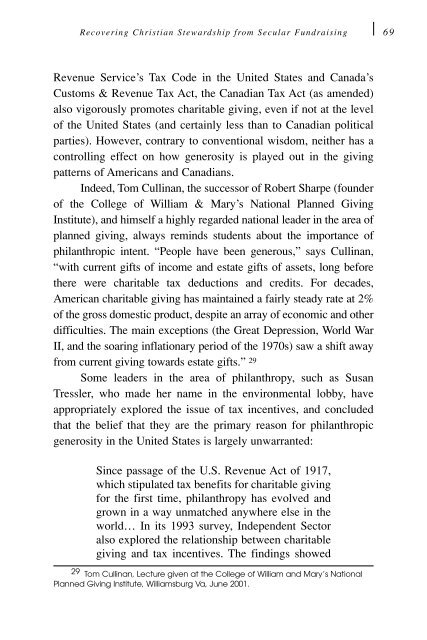Passionate Steward - 10th Anniversary Edition
10th Anniversary Edition of The Passionate Steward - Recovering Christian Stewardship from Secular Fundraising (St. Brigid Press - 2002).
10th Anniversary Edition of The Passionate Steward - Recovering Christian Stewardship from Secular Fundraising (St. Brigid Press - 2002).
You also want an ePaper? Increase the reach of your titles
YUMPU automatically turns print PDFs into web optimized ePapers that Google loves.
Recovering Christian <strong>Steward</strong>ship from Secular Fundraising 69<br />
Revenue Service’s Tax Code in the United States and Canada’s<br />
Customs & Revenue Tax Act, the Canadian Tax Act (as amended)<br />
also vigorously promotes charitable giving, even if not at the level<br />
of the United States (and certainly less than to Canadian political<br />
parties). However, contrary to conventional wisdom, neither has a<br />
controlling effect on how generosity is played out in the giving<br />
patterns of Americans and Canadians.<br />
Indeed, Tom Cullinan, the successor of Robert Sharpe (founder<br />
of the College of William & Mary’s National Planned Giving<br />
Institute), and himself a highly regarded national leader in the area of<br />
planned giving, always reminds students about the importance of<br />
philanthropic intent. “People have been generous,” says Cullinan,<br />
“with current gifts of income and estate gifts of assets, long before<br />
there were charitable tax deductions and credits. For decades,<br />
American charitable giving has maintained a fairly steady rate at 2%<br />
of the gross domestic product, despite an array of economic and other<br />
difficulties. The main exceptions (the Great Depression, World War<br />
II, and the soaring inflationary period of the 1970s) saw a shift away<br />
from current giving towards estate gifts.” 29<br />
Some leaders in the area of philanthropy, such as Susan<br />
Tressler, who made her name in the environmental lobby, have<br />
appropriately explored the issue of tax incentives, and concluded<br />
that the belief that they are the primary reason for philanthropic<br />
generosity in the United States is largely unwarranted:<br />
Since passage of the U.S. Revenue Act of 1917,<br />
which stipulated tax benefits for charitable giving<br />
for the first time, philanthropy has evolved and<br />
grown in a way unmatched anywhere else in the<br />
world… In its 1993 survey, Independent Sector<br />
also explored the relationship between charitable<br />
giving and tax incentives. The findings showed<br />
29 Tom Cullinan, Lecture given at the College of William and Mary’s National<br />
Planned Giving Institute, Williamsburg Va, June 2001.




